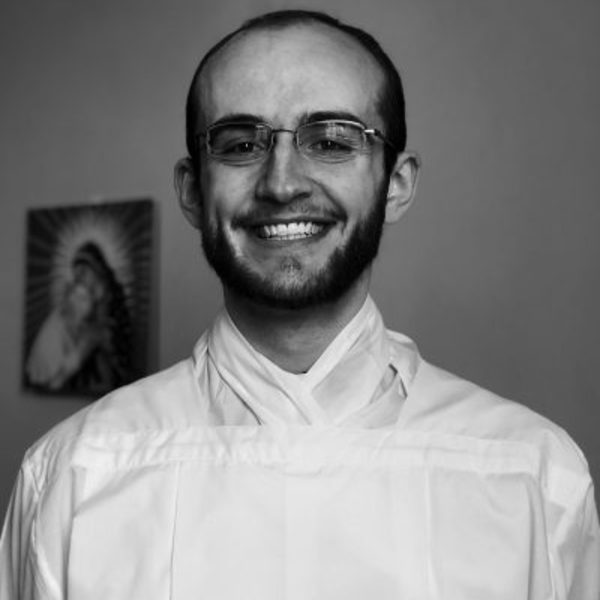Every Wednesday another seminarian and I work at a shelter run by Mother Teresa’s sisters, the Missionaries of Charity. The shelter is in the poorest ZIP code in the United States. The men there have messy and complicated lives — many are estranged from families, suffer addictions or check knives at the door — but somehow these lives seem to work out. These guys have almost nothing but they find what they need. Jobs, housing, treatment. Children are born. Things work out.
For all their suffering these men tread softly through life. They don’t seek attention or strive for honor — as the rest of us with attention or honor so often do. I’m awed at how their precarious situation has made them so human, in so many ways the kind of person I want to be. Despite the mess, things work out.
The same thing happens on a massive scale in the Offertory at Mass. Its brief and sometimes silent prayers can make the Offertory the easiest part of Mass to miss; sometimes I zone out entirely. But when I’m attentive the Offertory reassures me that what happens at the shelter is not confined to the lives of those 20 men. Things really do work out.
“Blessed are you, Lord God of all creation, for through your goodness we have received the bread we offer you,” the priest prays. These words lie between two extreme positions about how God acts in our lives.
- You’re great. you can do anything! Faith is nice too. (Pelagius)
- You are nothing. you’ll never produce anything good. Better believe in God. (Calvin)
In the first, God is irrelevant; you are all you really need. In the second, you are irrelevant; God must take you over. Pelagius and Calvin aren’t around anymore but these ways of thinking certainly are. As Americans we’re a conflicted hodgepodge of utter self-confidence and despair that we’ll never accomplish anything. Amazon’s plethora of recommended reads assure me other shoppers like me (they do exist!) have found books that assuage me and remind me just how awesome I am and can be. In the same breath magazine covers — for men as much as for women — guilt me for the fact I’ll never look quite as good as so-and-so, which is a strange and subtle form of despair. You will never look this good, so you must work harder!
The worshipping Christian pleads a different prayer, the prayer that God will work neither because nor around but through us. “We offer you” bread but acknowledge it comes “through your goodness.” It is not very impressive for a God to work around human nature; it takes much more skill to work through it. The Church presents God with bread, wine and a little water. These small gifts come from hours of farm and factory labor. We offer it, which means we surrender our own claim to these gifts and confess they’re meant to be shared. God gave us the earth. Climate being unpredictable, there’s no reason it had to be fruitful this year. But it was and we can’t escape the fact that our success was ultimately out of our control.
Even with all our work, we don’t have much to show. Each week we try our best — or try to try — but even when we’ve done what we can, our fruits can get meager or discouraging. Confusing relationships, imperfect projects, unattained goals. Beautiful things too, encouraging friends, work well done.
For his part, God chooses to accept these things and return them to us in a way greater than we’d ever imagine. God can take simple matter and totally transform it into his Body and his Blood.
The Offertory relieves me of the pressure to be perfect. Beneath papers, exams, goals or spreadsheets, I am a person God wants to bring back to life. God says he can still bring me back to life, not so much in spite of my weakness but through it. You can never do all the reading for a class, but you can finish a class having learned deeply. Edith Stein writes,
“And when night comes, and you look back over the day and see how fragmentary everything has been, and how much you planned that has gone undone, and all the reasons you have to be embarrassed and ashamed: just take everything exactly as it is, put it in God’s hands and leave it with Him. Then you will be able to rest in him — really rest — and start the next day as a new life.” (Edith Stein, “Fundamental Principles of Women’s Education” in Essays on Woman, ICS Publications: Washington, D.C., 145)
God perfects our work, not us, because at the end of the day it’s not ours. My hands want tightly to embrace the gifts I receive but even the good I do is the gift of God’s breaking through in me. If I keep these gifts, they make no sense. But I also can’t let go of life. Treading softly through life this way is real freedom. Like my friends in the South Bronx, we have nothing left to lose for we’re slowly realizing God is everything. We can’t keep anything we have, so we don’t.
If God can make bread into himself, surely he can do something even with us! As a result, Christians don’t get the luxury of abandoning society, politics and people — holding them off. We also don’t get the luxury of clutching — holding on. All we can do is offer them — holding them up. Offering is no holy shrug. It’s a proclamation of my confidence that God makes all things work for good.
Sam Bellafiore is a first-year seminarian for the Diocese of Albany, NY. He graduated from Notre Dame with degrees in Philosophy and Vocal Performance in 2015 and is in formation for the M.Div. at Dunwoodie Seminary in Yonkers, NY.

